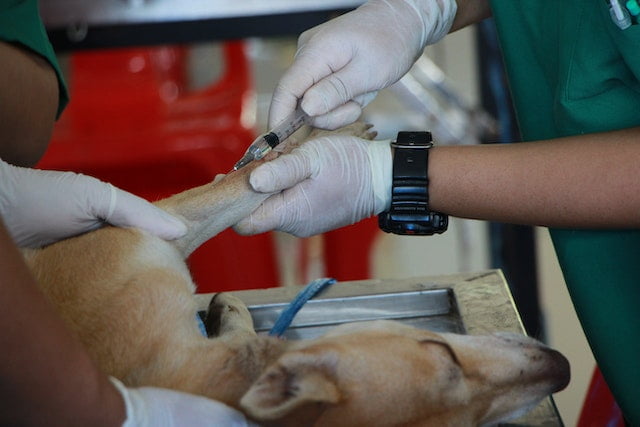Can Dogs Get Mono? Understanding Mononucleosis in Dogs (2024)
“Can Dogs Get Mono?” That’s a question on many dog owners minds, and we are going to give you some insights on this topic. To start with, mononucleosis, often referred to as “mono,” is a viral infection commonly associated with humans. However, many pet owners may wonder if their dogs can also contract this illness. Let’s delve into the topic of whether dogs can get mono, exploring what mono is, how it is contracted, and shedding light on the susceptibility of dogs to this viral infection.
Before we start, please note that the information provided in this article is for educational purposes only and should not substitute for professional veterinary advice. If you have concerns about your dog’s health, please consult with a qualified veterinarian.
What is Mono?
Mononucleosis, commonly known as mono, is an infectious illness caused by the Epstein-Barr virus (EBV) in humans. It primarily affects the immune system, leading to symptoms such as fatigue, sore throat, fever, swollen lymph nodes, and an enlarged spleen. While mono is predominantly associated with humans, it is essential to know whether dogs can also get this viral infection.
How is Mono Contracted?
In humans, mono is primarily transmitted through saliva, hence its nickname “the kissing disease.” Close contact with an infected individual, such as sharing drinks or utensils, can facilitate the spread of the virus. Additionally, mono can be contracted through coughing, sneezing, or other forms of direct contact with respiratory droplets.
Can dogs get Mono?
Yes, dogs can potentially contract a mono-like illness, although it is rare for them to specifically get mononucleosis caused by the Epstein-Barr virus (EBV) that affects humans. While dogs can experience similar symptoms to those of mono, the underlying causes are often different.
Read also>> Is Neosporin Safe for Dogs?
Transmission of Mono in dogs
The transmission of mono-like illnesses in dogs differs from how mono is transmitted in humans. In dogs, mono-like illnesses can be caused by various viruses and bacteria, as opposed to the specific Epstein-Barr virus (EBV) that causes mononucleosis in humans. Transmission methods can vary depending on the specific infectious agent involved. Here are a few possible modes of transmission for mono-like illnesses in dogs:
- Close Contact with Infected Animals: Dogs can contract mono-like illnesses through close contact with infected animals. This can occur through activities such as sniffing, licking, or playing with infected dogs. Direct contact with nasal or oral secretions, as well as infected urine or feces, can contribute to the transmission of infectious agents.
- Contaminated Objects: Mono-like illnesses in dogs can also be transmitted through contaminated objects. For example, if an infected dog uses toys, bedding, or food or water bowls that are then shared with other dogs, the infectious agents can be passed on. It is important to regularly clean and disinfect these items to minimize the risk of transmission.
- Environmental Exposure: Certain infectious agents that cause mono-like illnesses in dogs can persist in the environment. Dogs may come into contact with contaminated surfaces, such as floors, grass, or soil, where the infectious agents can survive for a period of time. This can contribute to the transmission of the illness.
- Maternal Transmission: In some cases, mono-like illnesses can be transmitted from mother to puppy during pregnancy, birth, or nursing. The infectious agents can be passed on through the placenta, birth canal, or milk, leading to the puppies acquiring the illness.
Symptoms of Mono in Dogs
Like we mentioned earlier, dogs can get mono-like illnesses, and here are the symptoms that come with the illness:
- Lethargy and fatigue
- Lack of appetite
- Fever
- Swollen lymph nodes
- Enlarged spleen
- Sore throat
- Respiratory symptoms (coughing, sneezing)
It is important to note that these symptoms may also be indicative of other health issues. Therefore, a proper diagnosis by a veterinarian is crucial to accurately identifying the underlying cause.
Read also>> Arizona Bobcat in Dog Bed: An Unlikely Encounter with Wildlife
Diagnosis and Treatment in Dogs
Diagnosing mono in dogs can be challenging due to the variety of potential causes for similar symptoms. A veterinarian will typically conduct a thorough physical examination and may recommend additional tests, such as blood work, to rule out other illnesses.
Treatment for mono-like illnesses in dogs focuses on managing symptoms and providing supportive care. This may include rest, a nutritious diet, hydration, and, in some cases, medication to alleviate discomfort or address secondary infections.
Prevention of Mono in Dogs
Preventing mono in dogs involves practicing good hygiene and minimizing exposure to potential infectious agents. Here are some preventive measures:
- Avoid close contact between your dog and infected animals.
- Regularly clean and disinfect your dog’s toys, bedding, and food and water bowls.
- Ensure your dog receives routine vaccinations to protect against common infectious diseases.
- Promptly isolate and seek veterinary care for dogs displaying symptoms of infectious illnesses.
Also, maintaining your dog’s overall health and immune system can play a vital role in preventing mono-like infections. So, endeavor to provide your dog with a balanced diet, regular exercise, and proper veterinary care to support its immune system and overall well-being.
Is it possible to get mono from a dog?
No, it is not possible for humans to get mono (mononucleosis) from dogs. Mono is primarily caused by the Epstein-Barr virus (EBV), which is specific to humans and not really found in dogs. What dogs experience is actually a mono-like illness caused by other viruses and bacteria, and these are not transmissible to humans.
Read also>> Best time to feed dogs so they don’t poop at night
What illnesses may dogs transmit to humans?
Dogs can potentially transmit various illnesses to humans, but not Mono in the actual sense. Some common examples include:
- Rabies: Rabies is a viral disease that can be transmitted through the bite or scratch of an infected animal, including dogs. It is a serious and potentially fatal illness for both dogs and humans.
- Salmonellosis: Dogs may carry Salmonella bacteria and can transmit them to humans through direct contact or by contaminating food or surfaces with their feces.
- Leptospirosis: This bacterial infection can be transmitted to humans through contact with the urine of infected animals, including dogs. It can cause flu-like symptoms and may lead to severe complications if left untreated.
- Ringworm: Ringworm is a fungal infection that can be transmitted from dogs to humans through direct contact with the infected dog’s skin or contaminated objects such as bedding or grooming tools.
- Campylobacteriosis: Dogs may carry Campylobacter bacteria in their feces, and transmission to humans can occur through contact with or ingestion of contaminated materials, resulting in gastrointestinal illness.
- Giardiasis: Giardia is a parasite that can infect dogs and cause gastrointestinal symptoms. It can be transmitted to humans through contact with infected dog feces or contaminated water sources.
Is it possible to become sick from dogs?
Yes, it is possible for humans to become sick from dogs. Although dogs are generally considered safe companions, but there are certain illnesses, like the ones we highlighted above, that can be transmitted from dogs to humans. However, the risk of contracting these illnesses can be minimized through good hygiene practices, regular veterinary care for dogs, and proper sanitation measures. It is important to seek medical advice if you suspect you have become sick from your dog.
Can dogs get germs from humans?
Yes, dogs can potentially get germs from humans. Certain illnesses caused by bacteria or viruses can be transmitted between humans and dogs. For example, dogs can contract the flu (influenza) virus from humans, and bacterial infections like Staphylococcus can be passed between humans and dogs. Good hygiene practices, such as regular handwashing, can help minimize the risk of transmitting germs between humans and dogs. It is also important to consult with a veterinarian if you suspect your dog has become ill after contact with a sick human.
Can dogs transmit kennel cough to humans?
Yes, dogs can transmit kennel cough to humans, although it is relatively rare. Kennel cough, caused by the bacterium Bordetella bronchiseptica, can be contagious to both dogs and humans. Transmission typically occurs through close contact with infected dogs, particularly through respiratory secretions like coughing or sneezing. However, the risk of transmission from dogs to humans is generally low.



